Argentina Residential Real Estate Market Analysis 2025
Argentina's housing market is gaining momentum, fueled by stronger demand and a recovery in residential construction, amidst a tightening supply of apartments. The outlook for the broader economy also points to a rebound this year.
Table of Contents
- Housing Market Snapshot
- Historic Perspective
- House Price Variations
- Demand Highlights
- Supply Highlights
- Rental Market
- Mortgage Market
- Socio-Economic Context
Housing Market Snapshot
In Q2 2025, the average listing price of used two-bedroom apartments for sale in Buenos Aires increased by 5.27% to US$2,310 per square meter (sqm) compared to a year earlier, according to figures from the Institute of Statistics and Censuses of the Autonomous City of Buenos Aires (IDECBA). This marked the sixth straight quarter of year-on-year price growth, following a prolonged decline that lasted from Q2 2019 through Q4 2023.
However, when adjusted for inflation, apartment prices declined by 24.48% y-o-y in Q2 2025. Despite this, the pace of decline was actually the slowest since Q3 2018.
Inflation-adjusted residential property prices in Argentina have been continuously falling in the past decade, weighed down by the country's persistent hyperinflation.
On a quarterly basis, nominal apartment prices in the capital city were up slightly by 0.26% in Q2 2025 but actually dropped by 5.42% in real terms.
Argentina's house price annual change:
Note: Buenos Aires House Price Index: Average Listing Price Per Square Meter of Used 2-Room Apartments for Sale (US dollars)
Data Source: Instituto de Estadística
This is supported by increasing demand. During 2024, there were 54,761 property sales transactions in Buenos Aires, up strongly by 35.1% from a year earlier and the highest level recorded since 2018, according to figures published by Colegio de Escribanos de la Ciudad de Buenos Aires.
Then in the first seven months of 2025, property sales transactions increased further by a huge 45.3% y-o-y to 36,179 units. Likewise, the total amount of transactions skyrocketed by 123.4% y-o-y to ARS976.9 billion (US$662.4 million) as of July 2025.
Residential construction activity is also showing some improvements. In July 2025, the synthetic indicator of construction activity (ISAC) showed an increase of 1.4% from a year earlier, in stark contrast to the year-on-year decline of 20.3% recorded in July 2024, according to INDEC. The cumulative figure for the first seven months of 2025 was up by 9.2% compared to the same period last year.
Overall, Argentina's property market is expected to gain further momentum through the rest of the year, supported by improving economic conditions. Both the International Monetary Fund (IMF) and the World Bank project Argentina's economy to expand by 5.5% this year, after suffering two years of economic recession.
"The outlook for the sector is encouraging. It is expected that real estate activity will continue its expansive phase and that construction activity will benefit from new developments that will allow it to take off," said BBVA Research.
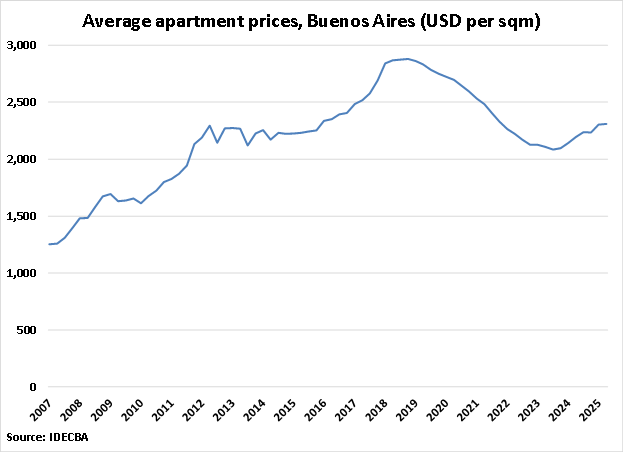
Prior to this, Argentina's prolonged economic and financial turmoil has undermined the property market for more than three decades.
In 1989, Argentina experienced a period of hyperinflation, with annual inflation reaching almost 5,000%. Combined with power cuts, this led to the downfall of Raúl Alfonsín's presidency. A similar crisis in 2001 forced another president, Fernando de la Rua, to vacate his seat, leading to what is now considered the largest-ever sovereign default, amounting to US$95 billion.
After experiencing robust growth of 6.4% from 2003 to 2011, Argentina suffered another crisis under populist leader Cristina Fernández, forcing it to default again on its debt in 2014. Stubbornly high inflation persisted, and the Argentine peso (ARS) lost more than 50% of its value from 2012 to 2015.
After a short-lived recovery, the country saw another economic recession. The economy contracted by 2.6% in 2018 and another 2% in 2019. As a result of the public outrage over the depressed economy, exorbitant inflation, and austerity, center-left Peronist Alberto Fernández defeated incumbent president Mauricio Macri in the 2019 presidential elections.
The Covid-19 pandemic exacerbated Argentina's suffering, with the economy contracting by a huge 9.9% in 2020. After growing by 10.4% in 2021 and by another 5.3% in 2022, the economy suffered a decline of about 1.6% in 2023 and another 1.7% in 2024. Even worse, the overall inflation skyrocketed to a staggering 133.5% in 2023, and then soared to a record-high of 220% in 2024.
Since 2019, the Argentine peso (ARS) has lost another 97% of its value against the US dollar, reaching an average monthly exchange rate of ARS1,325.08 = USD 1 in August 2025 from ARS 37.33 = USD 1 in January 2019.
Historic Perspective:
How capital controls thwarted housing market growth
The lackluster performance of Argentina's housing market in the past decade can be partly attributed to the imposition of capital controls in the country.
After 2011, capital controls introduced by then-President Cristina Fernández made it extremely difficult for most Argentines to acquire property. On the one hand, sellers demanded to be paid in dollars, which was proven safer than the peso. On the other hand, buyers were prevented from acquiring these dollars by strict currency controls. Thirdly, the indexation of peso loans has been forbidden since 2004, at the height of Argentina's currency crisis.
Coupled with high inflation, these factors caused the country's real estate market to enter a three-year crisis. In 2014, just 2,800 property sales per month were registered in Buenos Aires, a city of about 3 million people. That compares with 5,200 in 2010, 6,100 in 2007, and a historical average of 5,000, according to the Buenos Aires Notary College.
In addition, Argentina's very high inflation rates made granting peso-denominated mortgages too risky for banks. In 2015, the number of new mortgages in Argentina slumped to its lowest level in 15 years, accounting for just 1% of the country's total GDP - the lowest in Latin America, according to a recent report by the Housing Finance Information Network. This was down from 5.4% in 2000 - a drop that would have been considerably larger without the help of the government's Procrear housing program, according to a report by Ecolatina consultancy.
Immediately after taking office in December 2015, President Mauricio Macri began to reverse the economic legacy of populist former president Fernández, including devaluing the currency and lifting tight capital controls.
Ironically, Macri decided to reintroduce currency controls after he was defeated by Peronist candidate Alberto Fernández in the August 11, 2019, primary poll. On September 11, 2019, the central bank unveiled a new round of currency controls to tame speculation and stem a spiraling debt crisis. The new measure requires anyone purchasing foreign currency to present a sworn oath promising to wait at least five days before using it to purchase bonds.
Under previous regulations, a buyer could use foreign currency to purchase a bond and then immediately sell it at a more favorable exchange rate, easily gaining a profit of about 5% to 7%.
In other new measures, individuals seeking to purchase dollars face a monthly limit of US$10,000, and transferring money abroad requires government permission. The government also required companies and exporters to obtain permission from the central bank to access the foreign exchange market. In just over a month, the Argentine peso plunged by 20% against the US dollar.
From December 2015 to December 2019, the Argentine peso lost over 81% of its value against the US dollar. The domestic currency has been continuously plummeting since. In the past five years, the peso lost another 94% of its value against the US dollar.
The shift in Argentina's currency controls
On April 20, 2023, the BCRA issued Communique A 7746, providing several amendments to the country's foreign exchange regulations, in an effort to stabilize the plummeting domestic currency. The main provisions include:
- Payment of interest to related parties: to make payments abroad for the cancellation of interest services on commercial debts for imports of goods and services and/or financial loans, the central bank's prior approval is required until December 31, 2023.
- Payment for services abroad: a period of 60 days from the date of approval of the SIRASE (Import System of the Argentine Republic and Payment of Services Abroad) declaration is established for payment of various services, such as legal, accounting, advertising, engineering, and technical services, among others.
- Payments through local agents: a minimum of 90 days is established to access the FX market for the payment of freight services or other transportation services.
- Blocking period: the blocking period for accessing the FX market is increased to 180 days for specific transactions, including the domestic sales of securities settled in foreign currency, swaps of securities issued by residents for external assets, and transfer of securities to foreign depository entities, among others.
- Special account: companies are permitted to deposit the pesos they had planned to purchase the dollars to be applied to restricted payments into bank accounts whose compensation will be determined based on the official exchange rate.
Since Argentina's real estate market has historically been transacted in US dollars, every time the government imposes measures that restrict access to dollar liquidity, the housing market suffers.
In April 2024, however, the central bank introduced some relief by easing regulations for micro, small, and medium-sized enterprises (MSMEs). Under this change, imports of goods, including those with pending customs entry registration for up to 20% of the FOB value of capital goods, could be fully paid through the foreign exchange (FX) market within 30 calendar days of customs entry registration.
The most decisive shift came in April 2025, when the BCRA issued Communiqué A 8226, marking a turning point in Argentina's foreign exchange policy. Unlike earlier, limited adjustments, this reform significantly liberalized access to the official exchange market:
- Importers can now settle payments immediately upon customs clearance, removing the prior waiting period.
- MiPYMEs enjoy even greater flexibility, as they may pay from the moment goods are shipped.
- Service imports from unrelated foreign providers are payable as soon as the service is rendered, while related-party transactions saw their waiting period cut in half (from 180 to 90 days).
- For the first time in years, companies may remit dividends abroad, provided they come from audited financial statements beginning in FY2025.
- Several "parking" restrictions on securities transactions were either eliminated or relaxed, further easing FX access for businesses and investors.
Taken together, these measures represent the government's most substantial retreat from strict capital controls in recent memory, shifting the landscape from piecemeal relief toward a more open and predictable foreign exchange regime.
"The new phase of Argentina's stabilization program, supported by the Extended Fund Facility arrangement, has had a strong start, despite a challenging external environment. Appropriately tight macroeconomic policies have facilitated a smooth transition to a more flexible exchange rate regime and the easing of most foreign exchange restrictions and controls," said Ms. Kristalina Georgieva of the IMF. "Disinflation has resumed, the economy has continued to expand, and poverty has fallen further. Notably, Argentina has re-accessed international capital markets earlier than anticipated, although spreads remain high."
House Price Variations:
Apartment prices in the major neighborhoods of Buenos Aires
Residential property prices across Buenos Aires' major neighborhoods vary widely, with Puerto Madero topping the list as the most expensive area for apartments.
- In Puerto Madero, the average listing price of used two-bedroom apartments for sale increased by a modest 4.17% y-o-y to US$6,010 per sqm in Q2 2025, according to IDECBA. Quarter-on-quarter, prices were up by 2.47% during the latest quarter.
- In Palermo, apartment prices rose by 2.53% y-o-y to an average of US$3,089 per sqm in Q2 2025. However, quarterly, prices fell slightly by 0.72%.
- In Belgrano, apartment prices were up by 6.59% y-o-y and by 0.36% q-o-q to reach an average of US$2,875 per sqm in Q2 2025.
- In Nuñez, the average price of apartments rose by 8.04% y-o-y to US$2,968 per sqm in Q2 2025. But quarterly, prices dropped slightly by 0.99%.
- In Caballito, apartment prices were up modestly by 3.87% to an average of US$2,296 per sqm in Q2 2025 from a year earlier but declined slightly by 0.62% from the previous quarter.
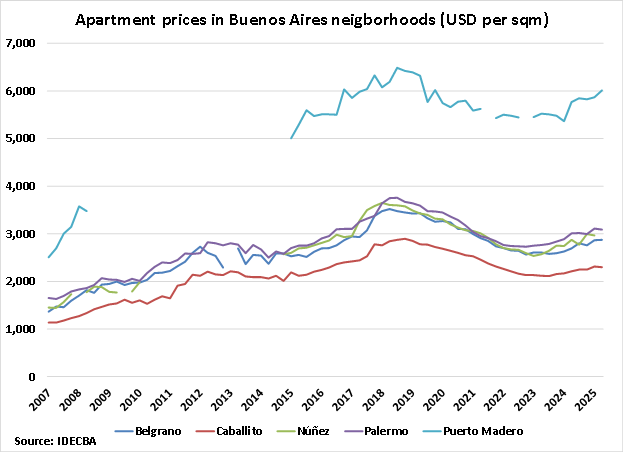
Demand Highlights:
Residential property sales continue to increase
Demand continues to gather pace. During 2024, there were 54,761 property sales transactions in Buenos Aires, up strongly by 35.1% from a year earlier, according to figures published by Colegio de Escribanos de la Ciudad de Buenos Aires. This followed annual growth of 20.1% in 2023, 17.1% in 2022, and 53.7% in 2021. In fact, it is now the highest level recorded since 2018.
However, it remains low by historical standards and is still far below the annual average of 65,000 sales recorded from 1998 to 2011.
In the first seven months of 2025, property sales transactions increased further by a spectacular 45.3% y-o-y to 36,179 units. In terms of value, the total amount of transactions skyrocketed by 123.4% y-o-y to ARS976.9 billion (US$662.4 million) as of July 2025.
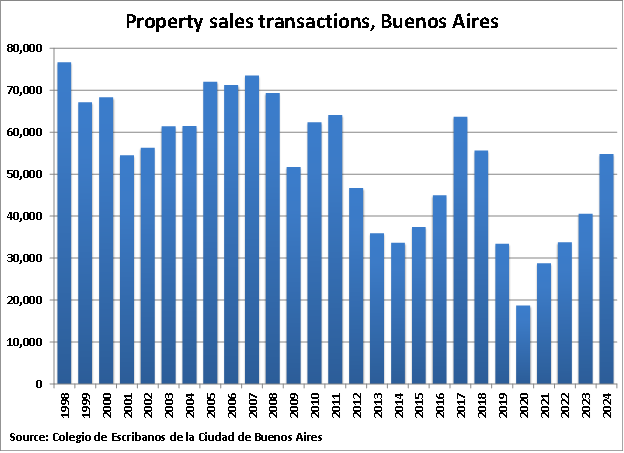
Supply Highlights:
Supply of apartments declining, construction activity gaining momentum
Residential construction activity in Argentina is increasing again, especially in Buenos Aires. In July 2025, the synthetic indicator of construction activity (ISAC) showed an increase of 1.4% from a year earlier, in stark contrast to the year-on-year decline of 20.3% recorded in July 2024, according to INDEC. The cumulative figure for the first seven months of 2025 was up by 9.2% compared to the same period last year.
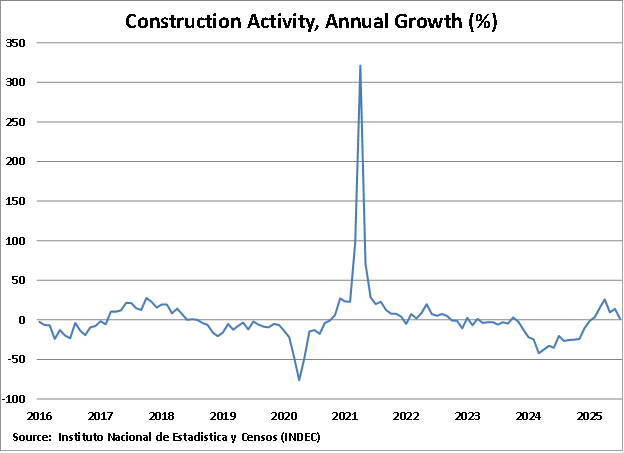
One of the reasons for the improvement in construction activity is the decline in the supply of apartments in the market. According to Daniel Bryn of Zipcode and head of the Real Estate Monitor, the overall real estate supply, including houses, propiedad horizontal, and other properties, has dropped by more than 30% from its 2020-2023 peak.
"The real estate market shows signs of greater dynamism, with more purchase and sale operations and a reduction in available stock," said Bryn.
By the end of 2024, Buenos Aires registered a total of 70,142 used apartments for sale, a decrease of 5.39% year-on-year, based on a report released by Monitor Inmobiliario.
Palermo, Recoleta, and Belgrano concentrate the largest number of properties for sale, driven by strong real estate development and sustained demand. Caballito and Almagro also stand out as active markets.
In Palermo, supply is dominated by pre-construction units, while in Recoleta, second-hand properties prevail. Belgrano offers a mix of family homes and newly built units.
At the other end of the spectrum, neighborhoods such as Puerto Madero, Villa Riachuelo, and Versalles show much lower supply. In Puerto Madero's case, limited turnover and high property values largely explain the shortage.
| Neighborhoods with Highest No. of Apartments for Sale, 2024 | |
| Neigborhood | No. of Apartments for Sale |
| Palermo | 12,377 |
| Recoleta | 6,638 |
| Belgrano | 6,407 |
| Caballito | 5,420 |
| Balvanera | 3,287 |
| Villa Urquiza | 3,082 |
| Nuñez | 2,982 |
| Almagro | 2,714 |
| Flores | 2,437 |
| Villa Crespo | 2,267 |
| Source: Monitor Inmobiliario, Infobae | |
Rental Market:
Rental yields are moderate
Gross rental yields on apartments in Argentina are moderate, especially by the standards of the continent (yields in Latin America tend to be high). The typical gross rental yield on an apartment - the rental return earned on the purchase price, before taxation, vacancy costs, and other costs - isn't something that will attract foreigners to invest, even if they could get a mortgage in Argentina, which they won't be able to.
Argentina's rent price index:
Data Source: Zonaprop
Nationwide, the average gross rental yield stood at 5.98% in Q2 2025, up from 4.64% in the same period last year, according to research conducted by the Global Property Guide.
In major cities:
- In Buenos Aires, gross rental yields for apartments are relatively higher, ranging from 4.91% to 9.60%, with a city average of 7.30%.
- In Rosario, gross rental yields are much lower, ranging from 2.79% to 5.33%, with a city average of 4.19%.
- In Córdoba, residential properties yield between 5.16% and 7.41%, with a city average of 6.45%.
Given that a typical landlord's expenses are around 2% per annum in maintenance, repairs, empties, etc., this means that many landlords will effectively earn significantly lower than expected. In fact, round-trip transaction costs are quite high in Argentina (i.e., the total costs of buying and selling a property).
Renting has, till recently, been the only option for many who have no means of saving and buying property, owing to limited mortgage lending. In the past years, rents have been continuously rising by double-digit figures. However, despite these rent increases, the rental market remains unattractive to landlords and property owners because of very high inflation and poor rental yields.
In Buenos Aires, a two-bedroom apartment is currently offered for a monthly rent of US$1,200 in Tigre; US$1,064 in Vicente López; US$843 in San Isidro; US$665 in Buenos Aires Costa Atlántica; US$612 in Morón; US$532 in Lomas de Zamora; and US$444 in both La Matanza and in Lanús.
In Rosario and Córdoba, a similar two-bedroom apartment is rented for US$429 and US$577 per month, respectively.
Mortgage Market:
Housing loan interest rates remain high, after BCRA kept its key rate unchanged
On January 30, 2025, the Banco Central de la República Argentina (BCRA) slashed its key interest rate "Leliq" by 300 basis points from 32% to 29%. It was already its ninth consecutive rate cut since President Javier Milei took office in December 2023, when the key rate was at a record high of 126%. The BCRA reached its decision amid evidence that lower inflation expectations have become more consolidated.
The central bank's latest move brought the key interest rate to its lowest level since October 2020.
"The Board of the BCRA decided to reduce the monetary policy rate from 32% to 29% APR. It also reduced the interest rate on repos from 36% to 33% APR. These rates will be in effect as of January 31," said the BCRA in its monetary policy statement. "The BCRA's decision was taken in light of the observed consolidation of lower inflation expectations."
The BCRA has held its benchmark rates steady since then, reflecting a cautious approach amid economic uncertainty.
However, in recent months, the country's financial system has been under significant strain as the BCRA's new reserve requirement scheme compels financial institutions to sharply raise interest rates.
The new rule obliges banks to maintain daily reserves, complicating liquidity management and pushing them to attract deposits by offering higher yields. While this benefits depositors, it simultaneously raises borrowing costs for consumers and businesses, making everything from personal loans to mortgages more expensive.
As a result, mortgage interest rates in the country have been increasing again in recent months. In August 2025, the average mortgage interest rate stood at 43.46%, far higher than the 27.89% in the prior year but much lower than the 78.57% registered two years ago, according to BCRA figures.
By maturity, in August 2025:
- Up to 5-year term: 47.70%, sharply up from 31.30% a year earlier and far lower than the 80.49% two years ago.
- Over 5 and up to 10-year term: 39.43%, up from 24.54% in August 2024 but down from 56.18% in August 2023.
- Over the 10-year term: 34.39%, higher than the 25.37% in the previous year, but still far lower than the 61.54% two years ago.
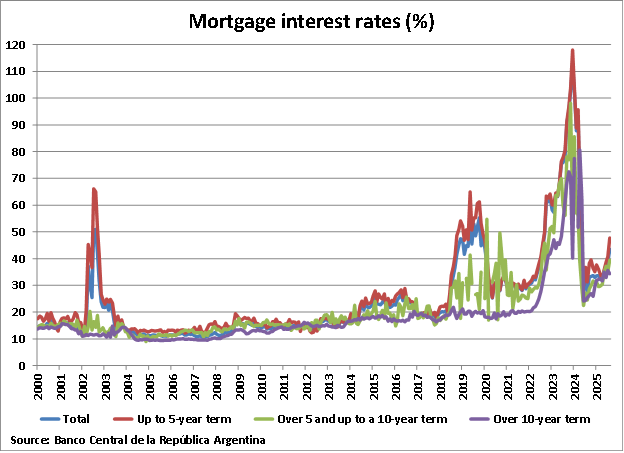
The collapse of the mortgage market
At the outset of former President Macri's term, the outlook appeared highly promising. Elected in December 2015, he pledged to deliver one million mortgages during his tenure. Within just three months, his administration devalued the currency and lifted strict exchange controls, moves that immediately triggered a surge in property quote requests.
"For the first time in years, homeowners want to exchange properties instead of sitting on their assets," said Alejandra Bugna, a property lawyer at Baker & McKenzie.
In April 2016, an inflation-linked mortgage credit system called Acquisition Value Units or Unidad de Valor Adquisitivo (UVA), similar to the system used in Chile and Uruguay, was introduced.
Under the scheme, real-estate prices either for rent or for purchase will no longer be denominated in US dollars or in pesos but instead will be denominated in UVA. The system guarantees that the transaction represents the same number of consumer price index baskets if, for example, there's a tighter or looser monetary policy. Rents will be priced at the same amount as UVA if the peso gets stronger or weaker. While the payment would be nominally higher with a devaluation, the payment's UVA value would remain constant.
In addition to the introduction of UVA, the government launched a subsidized mortgage scheme in March 2017 to grant subsidized mortgages to around 90,000 locals with monthly incomes ranging from ARS 16,000 (US$11) to ARS 32,000 (US$22).
Despite these measures, demand remained depressed. First-time homebuyers either delayed their plans to purchase homes or canceled their loans, mainly due to plummeting pesos. Then in 2020, the Covid-19 pandemic halted property transactions, making the situation even worse.
After the pandemic, mortgage loans surged back, growing at a rapid pace. In July 2025, the total value of outstanding mortgage loans denominated in national currency skyrocketed by a whopping 530.8% y-o-y to ARS4.3 trillion (US$2.9 billion), based on figures released by BCRA. Likewise, total outstanding mortgage loans in foreign currency also rose strongly by 213.2% y-o-y to ARS569 billion (US$385 million) over the same period.
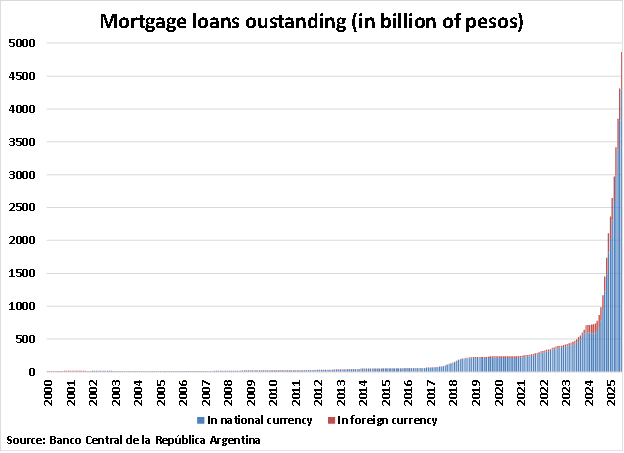
Despite the surge in the nominal value of total housing loans amidst exorbitant inflation, the mortgage market is actually shrinking. During 2024, the size of the mortgage market was equivalent to approximately 0.36% of GDP, down from 0.5% in 2022, 0.9% in 2020, 1.52% in 2018, and 5.36% of GDP in 2000, based on estimates by the Global Property Guide.
Homes in Argentina are priced in US dollars, even though buyers can only take out mortgages in pesos.
The situation is currently aggravated by soaring interest rates and the government's new regulations on foreign exchange controls.
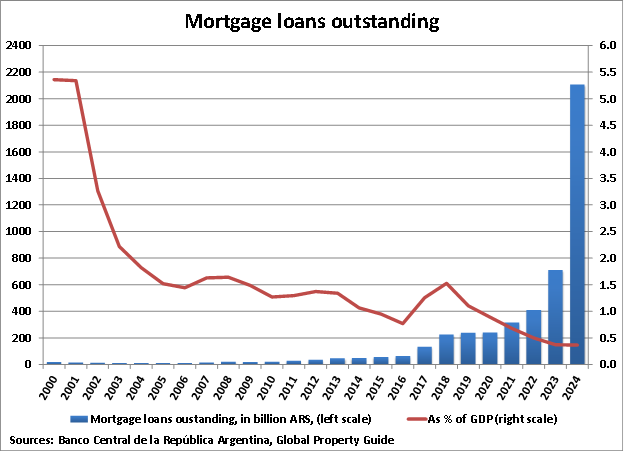
Socio-Economic Context:
Economy showing improvements, inflation easing
The hyperinflation-battered Argentina contracted by another 1.7% during 2024, following an annual decline of 1.6% in 2023, and in sharp contrast to annual expansions of 5.3% in 2022 and 10.4% in 2021
"In 2024, the economy contracted by 1.7%, reflecting both the recession that began at the end of 2023, due to a severe drought and the accumulation of significant economic imbalances, and the initial effects of the macroeconomic stabilization program implemented at the beginning of 2024," said the World Bank. "However, in the second half of the year, economic activity began to recover. By January 2025, GDP had reached levels close to those of March 2023, surpassing the decline recorded since the end of 2023."
In Q2 2025, the economy expanded by 6.3% compared to a year earlier, an improvement from year-on-year expansions of 5.8% in Q1 2025 and 2.1% in Q4 2024 and in contrast to annual declines of 2.1% in Q3 2024, 1.7% in Q2 2024, and 5.1% in Q1 2024. This marks the strongest pace of growth since Q2 2022, fueled by a rebound in agriculture as the impact of the historic drought that had heavily constrained grain production began to ease.
Though on a quarterly basis, Argentina's GDP fell slightly by 0.1% in Q2 2025, following a 1.1% expansion in the previous quarter.
With this, both the IMF and the World Bank project Argentina's economy to expand by 5.5% this year.
"By 2025, a growth of 5.5% is projected, driven by the consolidation of macroeconomic stability, investment in the energy sector, and a favorable performance of the agro-industrial sector in the context of benign climatic conditions," said the World Bank.
Prior to all of these, the economy contracted by 2.6% in 2018, 2% in 2019, and a huge 9.9% in 2020, with the Covid-19 pandemic aggravating the country's economic crisis.
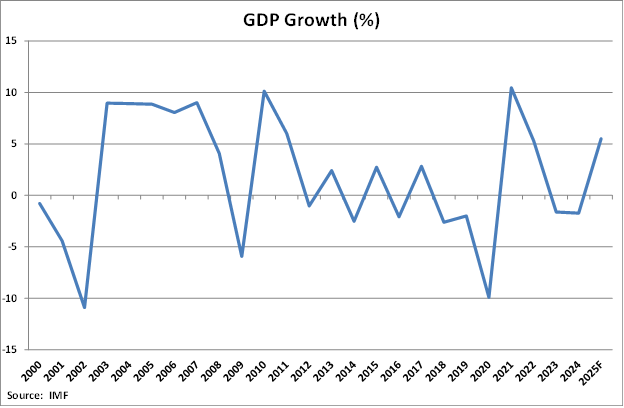
Argentina's stubbornly high inflation is another serious problem, though recent months show tentative signs of gradual easing. In August 2025, the overall inflation stood at 33.6%, slightly down from 36.6% in the previous month and a huge decline from a whopping 236.7% in the same period last year, based on figures from INDEC. In fact, it was the lowest level recorded since July 2018.
Argentina's inflation has been among the highest in the world in recent years, along with Venezuela, Sudan, Zimbabwe, and Turkey, among others. The country's inflation reached a record high of 292.2% in April 2024. Because of insane inflation, prices in restaurants are often written in pencil since they change so quickly that it makes no sense to print the "price" column in the menu.
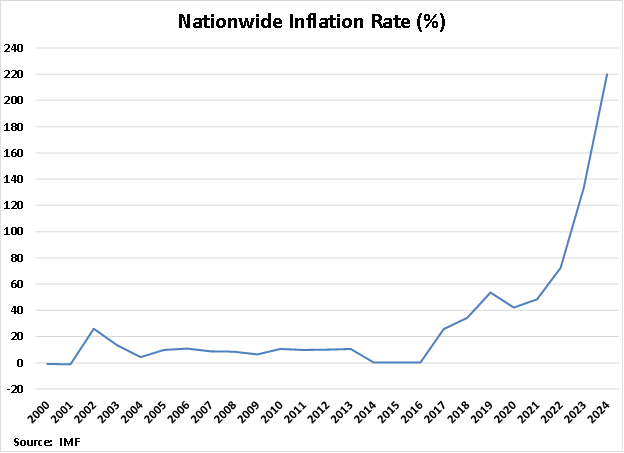
The labor market remains weak. In Q2 2025, the nationwide unemployment rate was 7.6%, down from 7.9% in the previous quarter but at par with the same period last year, according to INDEC. From an average of 9% in 2009 to 2019, the jobless rate surged to 11.6% in 2020 before falling again to 8.8% in 2021, 6.8% in 2022, and 6.1% in 2023. The jobless rate increased again to an average of 7.2% last year, amidst an economic recession.
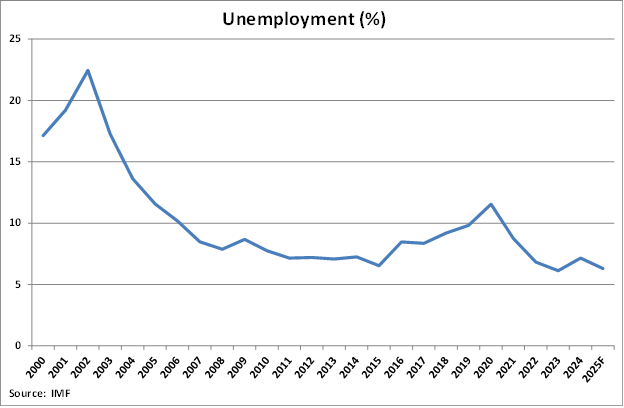
Argentina's plunging peso and financial turmoil
In 2018, Argentina received a whopping US$57 billion loan agreement with the IMF - the organization's biggest-ever aid package - aimed at shoring up the country's ailing finances. The loan comes with stringent conditions, including a commitment to a zero deficit for 2019. However, this was not achieved, as the value of the peso continued to plunge.
By 2019, the budget deficit was equivalent to 4.3% of GDP, down from 5.8% in 2018, 6.6% in 2017, and 6.4% in 2016. Yet, government debt ballooned to 85.2% of GDP in 2018 and further to 89.8% of GDP in 2019, sharply up from 56.5% in 2017 and 53.1% in 2016, mostly attributed to the stock of inflation-linked local currency debt.
The value of the Argentine peso (ARS) plummeted by about 74% against the US dollar in three years, from a monthly exchange rate of ARS 15.86 = USD 1 in December 2016 to ARS 59.83 = USD 1 in December 2019.
Argentina immediately imposed currency controls to shore up the peso and protect its depleted foreign exchange reserves. The government postponed payments on some short-term maturities and seeks a "voluntary reprofiling" of longer-term debt. This led the Standard & Poor's and Fitch Ratings to downgrade the country's credit rating to "selective default" and "restricted default," respectively.
As a result of the public outrage over the economic recession, high inflation, and austerity, center-left Peronist Alberto Fernández defeated incumbent president Mauricio Macri in the 2019 presidential elections. Fernandez vowed to increase wages and benefits to counter the country's economic crisis.
However, more than three years have passed since Fernandez assumed office, and there has been little sign that Argentina's economic suffering has eased. In fact, the Covid-19 pandemic even exacerbated the country's financial crisis.
The budget deficit surged to about 8.5% of GDP in 2020, mainly due to pandemic-induced government spending. It was the highest level recorded in recent history. As a result, government debt also skyrocketed to about 103.8% of GDP in 2020 - the highest level seen since 2004.
For just a year, the peso lost another 27.4% of its value against the US dollar, reaching an average monthly exchange rate of ARS 82.36 = USD 1 by the end of 2020.
In 2022, the government signed an IMF Extended Fund Facility (EFF) agreement after renegotiating the US$44 billion debt acquired by former President Macri in 2018. In March 2023, the IMF Executive Board completed the fourth review of the said arrangement, allowing an immediate disbursement of US$5.4 billion, which brings total disbursements to about US$28.9 billion.
Though economic minister Martin Guzman, who led the IMF negotiations over the restructuring of the national debt, resigned in 2022, amidst disagreements within the government.
In the November 2023 general elections, far-right libertarian outsider Javier Milei defeated his rival, economic minister Sergio Massa, in the presidential run-off. Milei's victory is a manifestation that voters are desperate for change and are already fed up with the country's prolonged economic crisis, soaring inflation, and widespread poverty. Milei's promise of introducing the US dollar as Argentina's official currency was met with applause by his supporters, but may spell financial disaster according to many economists.
"Argentina will return to its place in the world that it should never have lost. We are going to work shoulder-to-shoulder with all nations of the free world, to help build a better world," said Milei.
During 2024, the country's budget deficit was equivalent to approximately 3.4% of GDP, down from the shortfalls of 4.4% in 2023 and 4.7% in 2022. Government debt narrowed to about 83.2% of GDP last year, sharply down from 156.6% in 2023.
Unfortunately, the value of the Argentinian peso continues to plummet. From January 2021 to present, the peso depreciated by nearly 94%, to reach an average monthly exchange rate of ARS 1,325.08 = USD 1 in August 2025.
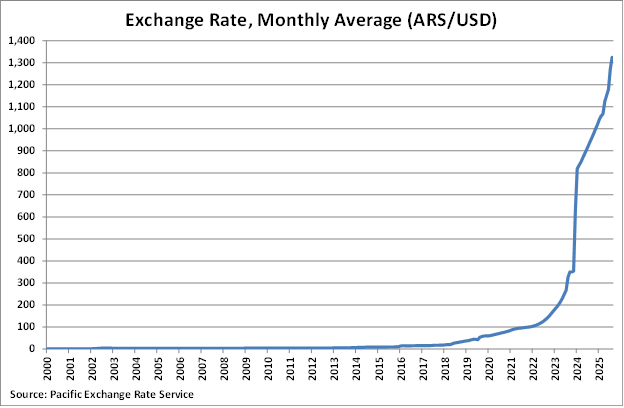
Argentina sees gradual credit rating recovery
After slowly moving out of the most dreaded "selective default" and "restricted default" credit scores, Argentina's credit rating is now improving but still considered at very high levels of credit risk.
In May 2025, Fitch Ratings raised Argentina's long-term foreign- and local-currency issuer default ratings (IDRs) to 'CCC+' from 'CCC'. The upgrade reflects the launch of a new IMF program and significant liberalization of the foreign-exchange market, which have strengthened external liquidity and reinforced the durability of President Javier Milei's stabilization agenda. Accordingly, economic recovery and disinflation have already surpassed earlier expectations and are likely to gain further momentum under these policies.
Then in July 2025, Moody's also upgraded Argentina's long-term foreign- and local-currency ratings to "Caa1" from "Caa3", a two-notch improvement but still remains in so-called junk, or non-investment grade status. The outlook was adjusted to stable from positive.
"The upgrade reflects our view that the extensive liberalization of exchange and (to a lesser extent) capital controls, alongside a new IMF program, support the availability of hard currency liquidity and ease pressure on external finances," said Moody's. "This reduces the likelihood of a credit event."
Though earlier, in February 2025, S&P Global Ratings kept Argentina's foreign currency sovereign rating at CCC/C with a stable outlook, while cutting its local currency rating back to SD/SD (selectively defaulted) after a distressed exchange.
Sources:
- Las escrituras en CABA alcanzaron en diciembre su máximo histórico en 7 años (Infobae): https://www.infobae.com/
- Por qué hay menos departamentos usados en venta en Buenos Aires: los precios y los 10 barrios más buscados (Infobae): https://www.infobae.com/
- Construction (Instituto Nacional de Estadística y Censos): https://www.indec.gob.ar/
- Investors see green shoots in barren Argentine real estate market (Reuters): https://www.reuters.com/
- Central bank to launch new mortgage plan (Buenos Aires Herald): https://buenosairesherald.com/
- Gross rental yields in Argentina: Buenos Aires and 2 other cities (Global Property Guide): https://www.globalpropertyguide.com/
- Índice de precios al consumidor (Instituto Nacional de Estadística y Censos): https://www.bcra.gob.ar/
- Argentina's pro-business outlook lures buyers back to Buenos Aires (Financial Times): https://www.ft.com/
- Argentina's Macri boosts mortgage credits to win back middle class (Reuters): https://www.reuters.com/
- Argentina: Interest rates soar in response to new BCRA rules (Merco Press): https://en.mercopress.com/
- Argentine Central Bank Eases Foreign Exchange Regulations for Micro, Small, and Medium Companies to Access the FX Market (Lexology): https://www.lexology.com/
- Communication "A" No. 8226 from the Central Bank of the Argentine Republic (Dentons): https://www.dentons.com/
- Argentina - Significant Relaxation of Access to Official Exchange Market (KPMG): https://kpmg.com/
- Deregulation of foreign exchange regime (Bruchou Funes de Rioja): https://bruchoufunes.com/
- Argentina Government Budget (Trading Economics): https://tradingeconomics.com/
- Argentina country profile (BBC News): https://www.bbc.com/
- IMF Executive Board Completes First Review of the Extended Arrangement Under the Extended Fund Facility for Argentina (International Monetary Fund): https://www.imf.org/
- IMF Reaches Staff-Level Agreement on the First Review under Argentina's Extended Fund Facility Arrangement (International Monetary Fund): https://www.imf.org/
- Argentina GDP Annual Growth Rate (Trading Economics): https://tradingeconomics.com/
- OECD Economic Outlook, Volume 2025 Issue 1 (Organisation for Economic Co-operation and Development): https://www.oecd.org/
- Argentina (International Monetary Fund); https://www.imf.org/
- Argentina's GDP seen growing in Q4 after shrinking for six quarters (Reuters): https://www.reuters.com/
- Argentina Overview (W0rld Bank): https://www.worldbank.org/
- Indice de precios al consumidor (IPC) August 2025 (Instituto Nacional de Estadística y Censos): https://www.indec.gob.ar/
- Mercado de trabajo. Tasas e indicadores socioeconomicos (EPH) Segundo trimestre de 2025 (Instituto Nacional de Estadística y Censos): https://www.indec.gob.ar/
- Fitch Upgrades Argentina to 'CCC+' (Fitch Ratings): https://www.fitchratings.com/
- Moody's hikes Argentina ratings up two notches, outlook stable (Reuters): https://www.reuters.com/
- Argentina Local Currency Sovereign Rating Lowered To 'SD' After Debt Exchanges; 'CCC' Foreign Currency Rating Affirmed (S&P Global): https://www.spglobal.com/